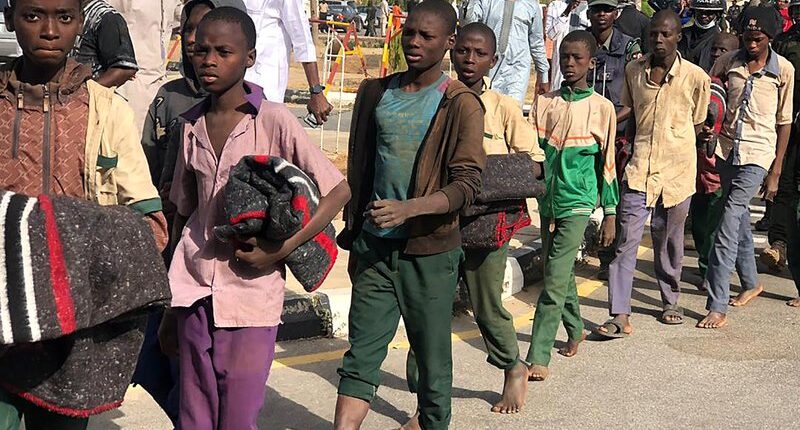More than 300 schoolboys kidnapped by gunmen from their boarding school in northwest Nigeria last week were handed over to security agencies late Thursday, Nigeria’s government said, prompting flow of relief and joy across Africa’s most populous nation after fears they would become long-term hostages of jihadist militants.
Aminu Bello Masari, the governor of Katsina state, announced in a televised interview that 344 of the boys had been handed over in the forest of neighboring Zamfara state and would be immediately driven to Katsina for medical treatment.
The release comes six days after the students were seized from their dormitories at the Kankara Government Science Secondary School in Katsina and driven into the nearby forest, marking one of the largest mass school kidnappings in history.
President Muhammadu Buhari praised the military and security agencies in a statement that offered prayers for the full recovery of the victims.
Local newspaper The Katsina Post tweeted images of dozens of schoolboys jammed onto the back of trucks, some looking dazed, but others sporting wide smiles for the camera as they headed toward home. Government officials said the boys would be given new clothes before an audience with the president on Friday.

Many of the details around the kidnapping, in a remote agricultural area with poor communication, remain murky, including the total number of victims and the true identity of their captors.
Jihadist group Boko Haram claimed responsibility for the kidnapping, saying on Tuesday it had seized the students to punish them for “un-Islamic practices.”
That claim was met with surprise by some analysts, as it marked a dramatic departure from the extremist group’s usual area of operation in the country’s northeast.
Others said Boko Haram leader Abubakar Shekau has expanded the group’s sway to the northwest, brokering new alliances with heavily-armed criminal networks.
The government hasn’t confirmed whether it believes the kidnappers were Boko Haram and denied that it paid a ransom.
The mass abduction came six years after the kidnapping of 276 schoolgirls in the town of Chibok, an abduction that ignited the global #BringBackOurGirls campaign.
After three years, 103 were freed for a ransom that people involved said included the exchange of five imprisoned militants and €3 million, about $3.7 million. The government has denied paying a ransom.

The news also marked a positive end to a grim week for President Buhari, a native of Katsina state who hadn’t commented on the news since Saturday.
In his first term, Mr. Buhari overhauled the armed forces and chased Boko Haram into remote strongholds in the forests of the northeast. He has since claimed that the insurgency has been technically defeated.
But since last year, the militants have been advancing, overrunning dozens of smaller military bases and looting weapons.
According to the U.S. Council on Foreign Relations, the period since July 2018 has been deadlier for Nigeria’s security-service personnel than any other time in the decadelong conflict.
The Kankara kidnapping has reignited fears over school security across the whole of Nigeria’s north. Boarding schools across four states have closed in response and it is unclear when they will open again.





